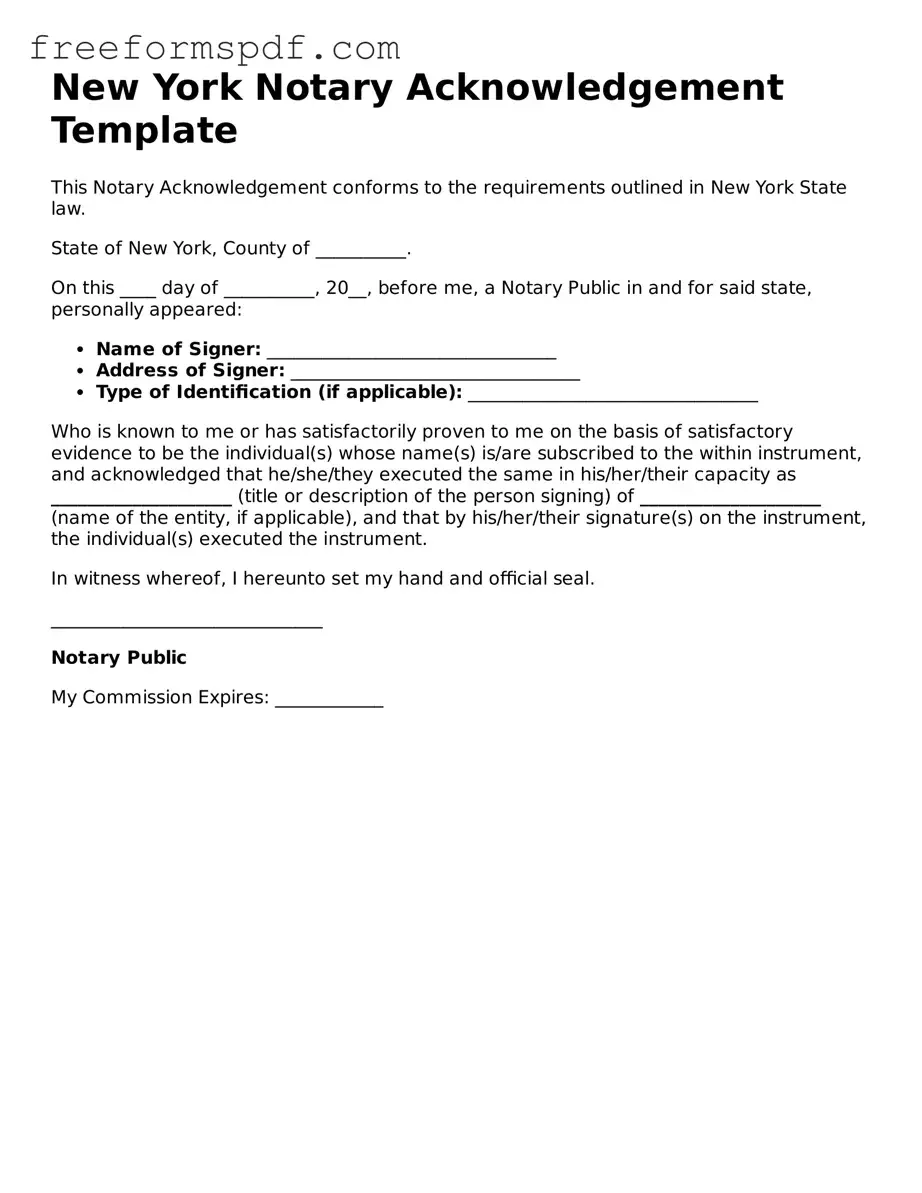Attorney-Verified Notary Acknowledgement Document for New York State
Common mistakes
-
Incorrect Signer Information: One common mistake is failing to provide accurate information about the signer. This includes the name, address, and any other required details. Always double-check this information to ensure it matches official identification.
-
Missing Date: Not including the date of the acknowledgment can lead to complications. The date is crucial for establishing when the document was notarized, so make sure to fill this out clearly.
-
Notarizing Without Presence: A notary must witness the signer’s signature in person. Some individuals mistakenly believe they can notarize a document without the signer being present. This is not permitted and can invalidate the acknowledgment.
-
Failure to Sign: Sometimes, signers forget to sign the acknowledgment form itself. Ensure that both the signer and the notary sign the document where indicated.
-
Using Incorrect Notary Seal: Each state has specific requirements for notary seals. Using a seal that does not meet New York’s guidelines can render the acknowledgment invalid. Always check the requirements for the seal before proceeding.
-
Not Providing Identification: The notary must verify the identity of the signer. If the signer does not present acceptable identification, the notary cannot proceed. Always bring proper ID when signing.
-
Neglecting to Review the Entire Document: Before finalizing the acknowledgment, it’s important to review the entire document. Missing out on crucial details can lead to future disputes or issues with the notarized document.
Learn More on This Form
-
What is a New York Notary Acknowledgment form?
The New York Notary Acknowledgment form is a document used to verify that a person has signed a particular document in the presence of a notary public. This form serves as proof that the signer is who they claim to be and that they willingly signed the document. The notary public will complete the acknowledgment by signing and sealing the document, thus providing a level of authenticity to the signature.
-
When is a Notary Acknowledgment form required?
A Notary Acknowledgment is often required for legal documents such as deeds, mortgages, and powers of attorney. It may also be necessary for documents that need to be filed with government agencies or courts. The requirement can depend on the specific type of document and the jurisdiction in which it is being used. Always check the requirements for your particular situation to ensure compliance.
-
How do I complete a Notary Acknowledgment form?
To complete a Notary Acknowledgment form, the signer must first appear in person before the notary public. The signer should bring the document that needs to be acknowledged. The notary will ask the signer to provide identification to confirm their identity. Once verified, the signer will then sign the document in the presence of the notary. The notary will complete the acknowledgment section by filling in the necessary information, signing, and applying their official seal.
-
Is there a fee for notarization in New York?
Yes, notaries in New York are allowed to charge a fee for their services. As of the latest regulations, the maximum fee for a standard acknowledgment is $2 per signature. However, it is advisable to confirm the fee with the notary beforehand, as some may charge additional fees for travel or other services. Always ensure you understand the costs involved before proceeding.
Misconceptions
Understanding the New York Notary Acknowledgment form can be challenging due to common misconceptions. Here are four of those misconceptions explained:
- Notaries can provide legal advice. Many people believe that notaries have the authority to offer legal guidance or interpret documents. In reality, notaries are not lawyers and cannot provide legal advice. Their role is to verify the identity of the signer and witness the signing of documents.
- All documents need a notary acknowledgment. It is a common belief that every legal document requires a notary acknowledgment. However, only certain documents, such as deeds and powers of attorney, typically need notarization. It's essential to check the specific requirements for each type of document.
- Notaries can refuse to notarize any document. Some assume that notaries can refuse to notarize any document at their discretion. While notaries do have the right to refuse if they suspect fraud or if the signer is not present, they cannot arbitrarily deny notarization based on personal feelings about the document or its contents.
- Notary acknowledgment is the same as notarization. Many people use these terms interchangeably, but they are not the same. Notarization refers to the overall process of verifying a signature, while a notary acknowledgment specifically refers to the notary's confirmation that the signer willingly signed the document in their presence.
By understanding these misconceptions, individuals can navigate the notarization process more effectively and ensure their documents are properly handled.
Some Other Notary Acknowledgement State Templates
Notary Acknowledgement Forms - This form can improve the trustworthiness of signed records.
A New York Non-disclosure Agreement (NDA) is a legal document designed to protect sensitive information shared between parties. By signing this agreement, individuals or businesses commit to keeping specific details confidential, ensuring that proprietary information remains secure. For a comprehensive understanding of this essential form, you can refer to the resources available at NY Templates, which provide valuable insights for anyone looking to safeguard their intellectual property or trade secrets.
Example of Notarized Document - The form must be filled out accurately to be effective.
Oregon Notary Acknowledgment - Sometimes required for court documents, the acknowledgment establishes the legitimacy of the signing process.
Notary Certificate Example - It does not involve the notary providing legal advice.
